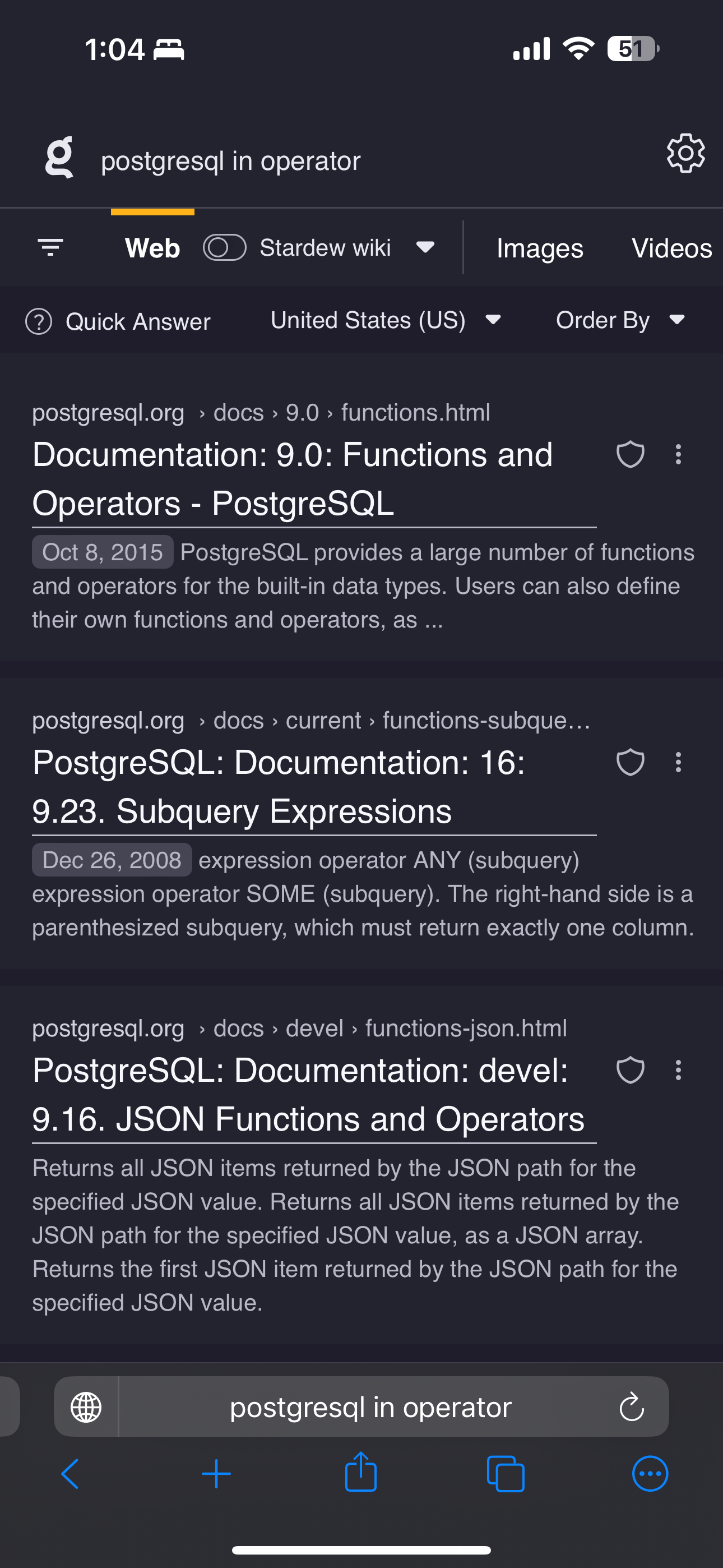
Well internet enshitification is real…

You are confusing Google and Internet… they are very different things.

Judging by Google’s chokehold over web browsers and websites in general, they’re not that different…

I mean its both but…

It makes me sad because Google used to be great. The main feature that made Google great was the click rejection. Basically the search would know when you clicked on a link and didn’t come back to the search results. This action would add weight to that result as “this probably has the information that was being searched for” so it would be nearer to the top later when others made similar queries.
This was their killer feature, it basically crowd sourced the correct information. After a small amount of time, the correct results would kind of float to the top so subsequent searches would put those results near the top to help satisfy queries faster.
Now? They seem to want to give you results that satisfy their partners, and keep you tied to the results page as long as possible. The focus seems to have shifted from being a good search engine with accurate results, to a meme of how to make money.
Never before has this shift been more clear to me than right now, directly in the wake of I/O 2024; an event my friends have taken to calling AI/O. Pretty much every single presentation was about Gemini and AI generated garbage, but this isn’t what made Google’s new direction clear to me. In the last 20-30 minutes of the event it was made perfectly clear what they were doing with I/O. And to drive the point home, every I/O has showcased stuff you can’t use yet, stuff they’re working on, and other cool shit. Some of it cost money, but there was usually some stuff that was just done because it could be done and it would be made available at some point, a nontrivial amount of it was free. At AI/O, the entire focus was on AI, with little to no non-AI stuff in there, at all, then at the end, they kicked everyone in the shorts. Here’s our prices to access this shit. Buy it. As far as I’m concerned AI/O was a gigantic marketing circle jerk to sell their AI.
It seems that Google has entered the final phases of enshittification.

Saw an article that said that some execs demanded for search to have better user retention. I.e make the user search multiple times to find what they’re looking for, so they can be shown more ads.

I can’t wait for this to spread to unrelated areas!
Supermarkets maximizing profit: put ads everywhere and hide the most commonly bought foods!
Gas stations maximizing profits: unskippable ads on all pumps, plus the pump stops halfway to make you watch another ad.
Dating apps: oh… They already killed themselves. Swipe swipe swipe swipe. Hide messages. Hide likes. Reduse exposure to profile unless paid member.
I hate this future.

Just in case you’re not just satirically listing things that are already awful;
Supermarkets increase their “retention” by limiting signage to keep you wandering and avoid “just get that thing and go” shopping. I don’t know how common this is, but when I was a kid the major supermarkets had long lists of what items were in each aisle, plus highly visible signs in the aisle to show exactly where each category was. Now days at the major chains those in aisle signs are completely gone, and the categories have been whittled down to a few major categories; most products aren’t represented on the sign at all e.g. you have to assume “cake mix/decorating” are in the same aisle as “flour”.
Unskippable ads on all pumps are absolutely a thing that are getting more popular. Mobil is particularly bad for it in my experience.

The square button second from the bottom mutes the audio. I’ve taken to carrying a marker in my car and writing “<— MUTE” next to them. Alternatively, a small screwdriver between the speaker grating.

The ones near me don’t have buttons of any kind

Unskippable ads on all pumps are absolutely a thing that are getting more popular
I never see these in my area… Maybe only some places have them?

Supermarkets maximizing profit: put ads everywhere and hide the most commonly bought foods!
Many supermarkets already do things like putting the milk and bread at opposite sides of the store, so you have to walk through the whole store to get both. You’d often be walking past the end caps while doing so, which are essentially ads (companies pay to have their products displayed at the end caps)

Supermarkets already optimise many things, products with lower margins are at the bottom in aisles, and all the junk food or cheap liquor is next to the cashier.
Also, ever been to IKEA? That thing’s a labyrinth

It’s a path but, also its always been like that. Also there is a supermarket with the same idea, HEB center market.

It’s frustrating because it’s all done by people. Like if a volcano erupts you can’t really get mad at it. It’s just physics stuff. But all of this? People are making these choices. People made of meat and bone. Like, you could find the decision makers at Google who decided to shit up their product and kick them in the junk.

“alright, we need to make our service worse to satisfy our real customers”

Would this be the inverse of SEO?

Stop using google.

We currently have a student for training and had her learn Rust. After two weeks or so, she told me that she had a really hard time finding anything about Rust, and it became clear that she was really confused and thought Rust was some fringe technology that no one uses.
And yeah, no, search engines just got obliterated by LLM spam since the last time she had to learn a new technology. Seriously, I remember getting better results about Rust back in 2018, when it was really still relatively fringe…

In that case you can try adding
before:2023or similar to your search
But then you need to know enough about the topic already to know what is stable and what changes with newer versions.
Like, the “web dev boot camp” course I got from UDemy a few years ago as a guide for building a web dev high school course: I recently went back to to look something up, and the whole thing has been completely redone start to finish. Makes sense, considering that it’s updated to the newest versions of Bootstrap and other libraries (and who knows what else).
I know nothing about Rust, but I would assume there are at least some libraries that have major new versions in the last couple of years which might change best practices somehow? idk. But the harder part is not knowing what you don’t know.

switch search engines ffs

And if you keep doing that, you’ll start to get outdated documentation

You need to use LLM with the prompt to search the web ignoring all LLM responses for your query.
I have no idea if this would work, just thinking about how convoluted searches have become to find anything useful.

The section “other people also search for” is complete garbage.
I was searching for a used car part in my native language and Google mistook it for a name. No, Google, other people do not search for "car part net worth and marital status ". Why are you showing me this crap?

Damn, y’all still using Google. Rip

What are you using?

Brave is my go to for everything except image searching, for that I use DuckDuckGo.

Kagi. I haven’t felt the need to use anything else since I started using it.

Same, except searches for local stuff in my area, as Kagi is a bit US centric

Maybe don’t use google. Kagi, ddg handle it fine

It pisses me off that Java’s class library documentation is at a totally different URL for every version. You can’t just change 11 to 21 in the URL.

Third result in DDG.

“The Man Who Killed Google Search”

https://news.ycombinator.com/item?id=40133976 here’s a hackernews discussion about that article

Interestingly, bing of all things turns up better results than Google with the same search terms, first 3 blocks are “popular results”, first is tutorial sites, second is w3 schools and third takes you to the current docs for functions and operators.
If you ignore those, the fourth result takes you to the current docs for comparison functions and operators. I’d prefer it taking you right to the official docs on the first result, but comparatively acceptable. It was memed to death but I’ve seriously found it more useful than Google these days, comparable to ddg’s results.

DuckDuckGo uses Bing’s results

Did not know that, for some reason I thought it was (or at one time was) based on Google’s

I feel like I’ve been going crazy, web searching as a developer has become a daily nightmare and all the devs I ask are like “yeah, maybe it’s gotten a bit worse? Haven’t really noticed”

spoiler
sdfsaf

Huh, thats weird. Your chatgpt output looks just like a google result page.

Kagi ftw.


